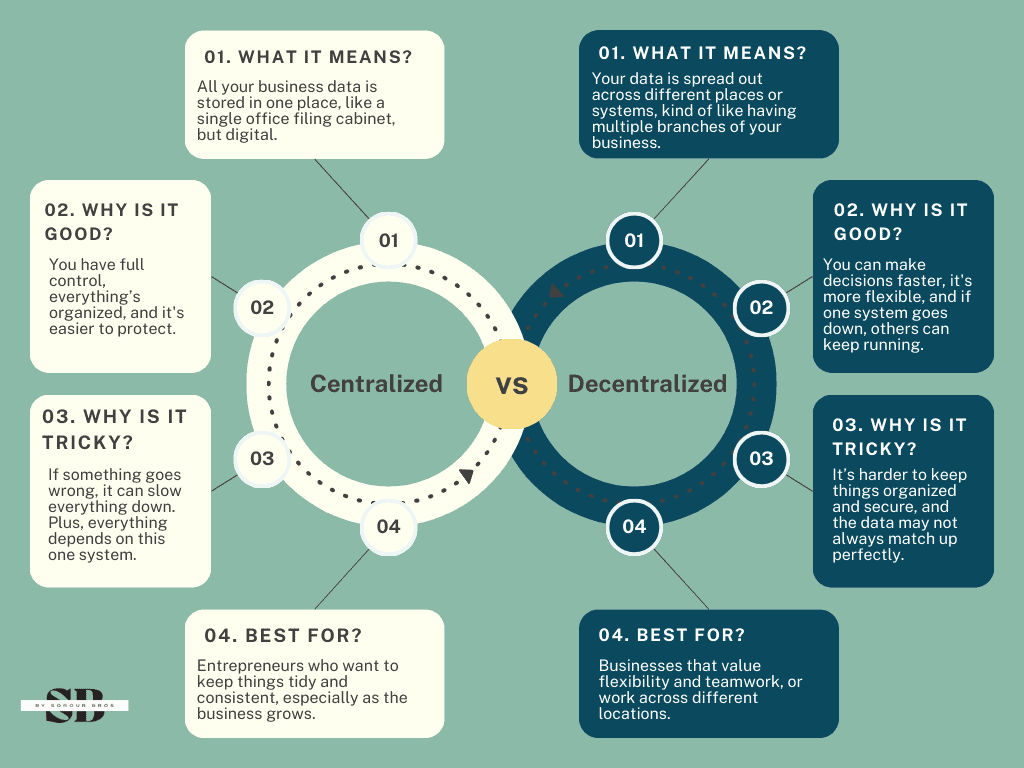How Data Democratization Can Transform Your Business

Written By:
Last Updated Date:
TL;DR
Imagine running your business where every team member, from sales to customer service, can get the needed data without asking anyone else. Data democratization delivers that. It gives your whole team the ability to make decisions fast.
It’s not about fancy tools; it’s about making data simple and accessible so your team can respond to problems, spot new opportunities, and improve how you serve your customers. Whether you’re adjusting marketing or managing inventory, having the right data in front of you helps you make better decisions in real-time. In today’s fast-paced market, it’s not just about working harder; it’s about working smarter, and data democratization helps you do that.
Key Takeaways
- Empower Your Team: Give your team access to data, and they can make decisions faster and smarter without having to ask someone else. This will help everyone move faster and get in sync.
- Boost Efficiency: By making data easy to access, you can eliminate delays and bottlenecks when tweaking a marketing strategy or adjusting your inventory.
- Stay Competitive: In a fast-paced world, data democratization helps your small business stay one step ahead, turning insights into action without the extra hassle.
How Innocent Drinks Blend Their Way to Global Success?

Imagine running a successful smoothie business but hitting a wall. Your product is everywhere, and your brand is growing, but somehow, your teams are struggling to keep up. Sound familiar? This happened to Innocent Drinks, a quirky UK-based smoothie company famous for its funny marketing and natural ingredients.
Growing Pains
Innocent Drinks was growing fast in the mid-2000s. They had a product people loved, but it wasn’t all plain sailing behind the scenes. With multiple regions to supply and customer demand changing constantly, their teams were hitting roadblocks.
The supply chain was too slow to respond to demand spikes. Imagine your best-selling flavors running out of stock! Their marketing team had great ideas but no real-time data to test them. And customer feedback? It was sitting in siloed systems, out of reach of the people who needed it most.
These inefficiencies were holding a growing business back. The worst part? Each team was waiting for the IT department to run reports before they could act. By the time the data arrived, the moment to act was already gone.
Data Democratization
That’s when Innocent Drinks made a big decision. They democratized data, making it available to every department, including marketing, product development, supply chain, etc. Instead of waiting for IT to run reports, teams now had real-time access to the needed data.
The marketing team could see which promotions were driving sales. Product development could track customer preferences and innovate faster, launching new flavors that hit the mark. And the supply chain team? They could forecast demand more accurately so popular smoothies didn’t run out. Everyone was suddenly on the same page and able to act fast.
Enable Teams to Innovate
This wasn’t just about making life easier. It was about staying competitive in a world where speed was everything. Innocent saw bottlenecks holding them back, and they realized that the faster they could react to data, the quicker they could innovate and meet customer needs. They didn’t want their competitors to advance because of slow decision-making, so they jumped and put data in everyone’s hands.
The Smooth Path
The results were terrific. Teams were working smarter and faster. The product development team could now test and launch flavors customers wanted based on real-time feedback. Marketing could pivot campaigns instantly if they weren’t working, saving money and increasing engagement. And the supply chain? No more stock shortages of best sellers.
This level of agility helped Innocent grow even faster, and by 2013, they were big enough to attract the attention of Coca-Cola, which purchased a majority stake in the business. What started as a small team of founders selling smoothies at a festival booth had become a global brand, and data democratization was one of the key reasons they could scale so successfully.
What did you take away?
Innocent Drinks’ story shows that giving your team instant data access isn’t lovely. It’s a must-have in today’s fast-paced business world. Whether it’s your sales team, marketing team, or product developers, enabling them with data lets them act faster, make better decisions, and ultimately drive your business forward.
So, if you feel like your business is stuck in the same bottlenecks Innocent was, ask yourself: Is your data available to everyone who needs it? If not, it might be time to follow Innocent’s lead.
What is Data Democratization?

History of Data Democratization
Traditionally, IT controlled the data, and business users had to request access, resulting in a messy spreadsheet. This created a roadblock for business analysts and prevented the company from being data-driven.
With the rise of big data and advanced analytics, organizations realized the importance of making data available to everyone. Data democratization was born to solve this problem, simplifying the data stack and making data available to different teams.
So, what is Data Democratization anyway?
Data democratization is about making data available to all members of an organization. It’s about breaking away from the old model where only IT or data scientists could derive insights from complex databases. Companies can ensure that everyone can make informed, data-driven decisions by providing user-friendly tools. This means all organizational members can access data without relying too much on IT departments and making data-driven decisions.
The process creates a culture of transparency and innovation across departments. Democratization isn’t just about access but also about empowerment. Training employees to use data effectively becomes a common language within the organization.
What do industry experts say about data democratization?
Industry experts say this cultural shift requires strong governance to ensure data integrity while making it available to everyone. This inclusive approach leads to faster decision-making and makes data a core asset not limited by silos or technical expertise. Managing these data assets can streamline your business and improve overall performance.
Why Data Democratization Matters?

The benefits are massive. It changes the whole organization. And that means better decisions overall. So, let’s get to it:
- Faster, Better Decisions: When data is available to everyone, employees can make decisions quicker. No more waiting for reports or approval from the data team means faster action and problem-solving.
- Collaboration across Teams: Data democratization breaks down silos. Marketing, sales, and customer service teams can access the same data and develop more innovative ideas and strategies.
- Increased Productivity: Self-service tools for employees allow them to run their data analysis without needing data scientists. Your data experts can focus on more complex and strategic work.
- Better Customer Insights: Real-time data means teams can serve customers better with more personalized and timely responses. This means happier, more loyal customers and better business performance.
It creates a culture of transparency, accountability, and inclusivity, which means better customer experiences and business outcomes. Good data management practices are essential to data quality and accessibility so organizations can get more out of their data.
Data Democratization and Data Literacy Challenges

Overcoming data democratization is critical to organizations’ getting the most out of their data. One of the biggest challenges is data literacy, which means employees lack the skills to interpret and act on data.
Without understanding, this can lead to bad decisions. The solution is ongoing data literacy training so employees can confidently analyze and apply data. Data visualization tools can help employees interpret and analyze data trends and make informed decisions. This empowers them and helps create a data-driven culture.
Another challenge is data governance, as more data is being made available. It would be best to implement robust data governance frameworks, including role-based access control and clear guidelines for accessing and using data to mitigate the risks. This would ensure that sensitive information is protected while more data is available.
Data democratization requires a cultural change within the organization. Leadership must lead by example, incorporate data into their decision-making, and celebrate data-driven wins to encourage organization-wide adoption of data usage.
So why, according to industry experts?
As industry experts say, data democratization is all about empowering employees, strong leadership, robust governance, and data literacy across all levels of the organization to ensure everyone speaks the same “data language” so everyone can collaborate and make better decisions.
Tools for Data Democratization and Data Access

Data democratization requires tools that make data available, easy to interpret, and actionable for everyone. Self-service analytics platforms like Tableau, Power BI, and Databricks are essential because they allow non-technical users to visualize and analyze data without IT support. These tools are the key to data democratization, making data available and understandable to all employees.
These platforms allow employees to investigate data and make the workforce more agile and responsive. Cloud storage solutions like AWS and Google Cloud are equally important, providing centralized, scalable data access from anywhere and breaking down physical and technical barriers.
Also, platforms like DataCamp offer training to improve data literacy so employees can work with data effectively. These tools together break down silos and improve decision-making and innovation across the organization.
How do you Get Started?

Ready to start data democratization? Here are the steps to get you going:
- Audit Your Data: Take a deep dive into your current data infrastructure. Where is your data stored, who has access to it, and what tools are being used? Identify any data silos or inefficiencies that are holding you back. How are your data assets managed, and where are the opportunities for improvement?
- Set Your Goals: What do you want to achieve with data democratization? Clear goals will guide the process, whether better customer support response times or more cross-department collaboration.
- Centralize Your Data: Store all your data in one place, ideally in the cloud. This way, employees don’t have to search multiple platforms for their needs, and governance is more accessible.
- Invest in Training: Data democratization only works if your employees know how to use the data. Offer training so everyone knows how to analyze and apply data in their role.
- Enact Governance Policies: Establish policies around who can access what data, how data should be used, and how to ensure data quality. Role-based access control can help with security while enabling democratization.
There are centralized and decentralized approaches; depending on your goals, you might choose the one that suits you. As a data engineering expert, I suggest storing backed-up data in a different region to secure your data. So that if something wrong happens or the system is damaged, you can get backup data to assist you and not start all over again. Now, back to the difference between them, I will make it simple for you:

So now you have the idea and can choose what’s best for you, whether you want more flexibility and teamwork across different locations or better tidy, organized, and consistent things. Choose what makes you feel better.
Again, as a data engineer expert, I like the data to be organized, and as a business leader, you want the work done as fast as possible. If you choose something like Google Cloud or AWS, you will see that there are cheap options and that it’s so flexible.
Your employees can progress faster with more organized data and get better insights for you with no chance of mistakes. But if there are any mistakes, that’s how we learn and grow. We can examine the problem and prevent it from happening again. That’s how we grow and outwork others. Stay sharp.
Conclusion
Data democratization is not a nice thing in today’s digital world; it’s a must. By giving your entire organization access to data, you’re unlocking innovation, speeding up decision-making, and future-proofing your business. Data democracy means all employees can contribute to the company’s success through informed, data-driven decisions.
Whether you’re just starting your data journey or looking to optimize an existing strategy, now is the time to get data democratization. It’s not about giving people access to data. It’s about giving them the tools and confidence to use it.
Frequently Asked Questions (FAQ)
I’m a Data Enthusiast and Content Writer with a passion for helping people improve their lives through data analysis. I’m a self taught programmer and has a strong interest in artificial intelligence and natural language processing. I’m always learning and looking for new ways to use data to solve problems and improve businesses.







Can you be more specific about the content of your article? After reading it, I still have some doubts. Hope you can help me.